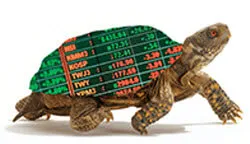You have probably seen the much-published but unsubstantiated statistic that 95% of traders fail. Whether it’s a true fact or not, it’s not a difficult number to believe.
It certainly does seem that trading is at times an impossible business and that far more than half of all traders lose all their money and quit in disgust or despair.
The good news, however, is that traders are actually more a product of environment than of nature.
In other words, even if you don’t have an instinctive feel for the market, you can still become a great trader.
This is because trading, like many other fields, can actually be taught. You don’t have to be a natural. You can start out with nothing, and via education and practice, you can become a great trader.
This theory has actually been proven when two commodities traders in the 1980s decided to put it to the test.
In 1983, Richard Dennis and Bill Eckhart debated whether or not trading was an innate talent, or whether it was a skill that could be taught. Eckhart argued that the talent came from within, while Dennis put forth the proposition that trading was a learned skill like any other, and that anyone with the proper education could become a great trader.

Dennis set out to prove his point by taking on 23 students, from all kinds of backgrounds, and he dubbed them the “Turtles,” since he intended to grow them from “babies” to adulthood.
He gave them a brief 2-week education in commodities futures, along with a strict set of trading rules to follow, and then turned them loose with $1 million each in a practice account. Once they proved they could follow his instructions, he gave them real money to trade.
The system they followed was a trend-following system, and it included rules for entering and exiting positions, as well as how to size and when to add to positions. There was, however, a degree of discretion allowed in how the rules were implemented.
The experiment ended 5 years later, reportedly with a final account balance in the neighborhood of $100 million.
Since then, many of the original Turtles have disappeared from the public eye, but some still manage money very successfully, although they do tend to keep a low profile.
The Turtle experiment was judged a resounding success and has been held up ever since as an inspiration for millions of traders. The exact rules that Dennis utilized has been published repeatedly, as have many accounts of the lives of the Turtles themselves. Amazon, for instance, has some good books on the Turtles.
This story has become a legend among traders of all kinds, proving definitively that great traders can become that way through education, practice, and discipline (sticking to a proven trading system).
Where most traders fail in this process is the discipline part. It’s extremely difficult to stick to a trading plan through the inevitable downturns, and that is the point when many traders will start to abandon one method in favor of another, which inevitably leads to system-hopping and potential failure.
The lesson that should be learned from the Turtle experiment is not necessarily the exact methods and rules that they used, but the fact that a system with an edge, any system, can be learned, and that learning can lead to success if applied properly.
Great traders are not just lucky. They are smart, they are disciplined, they learn from their mistakes, and they practice continuously. They view the process of trading as a learning process, and they continue to educate themselves and to expand their knowledge.
Remember, *no one* is born a great trader. All great traders are made.
And that means that YOU can be a great trader too.



